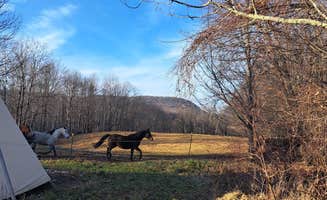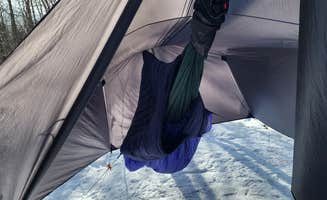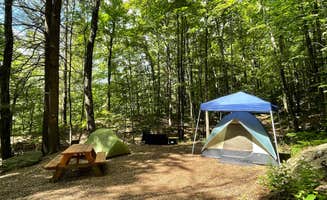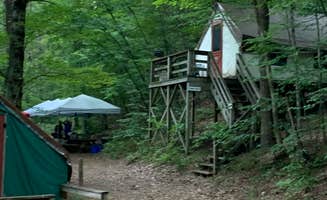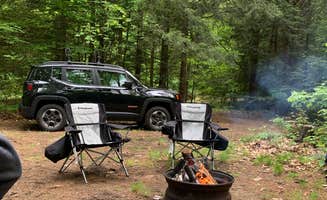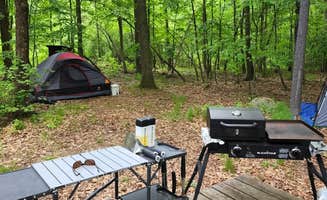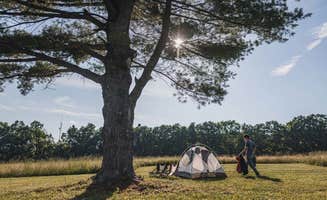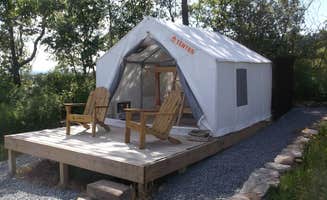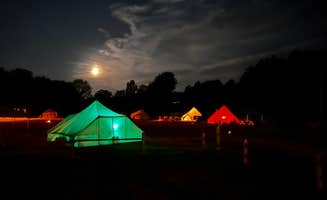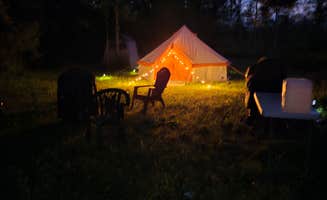Primitive tent camping near Johnsonville, New York offers backcountry experiences ranging from boat-accessed island sites to trail-accessed forest campgrounds. The region sits at the border of New York and Vermont, with camping options spanning both states within a 30-mile radius. Winter camping requires additional preparation with temperatures frequently dropping below freezing from November through March.
What to do
Hike to backcountry shelters: Stratton Pond Shelter combines camping with access to multiple trail systems. "The shelter is a 3.75mi hike from the nearest parking lot in winter. There are 2 tent platforms, 2 outhouses and at least 16 bunk spaces in the shelter," reports Miccal M. from Stratton Pond Shelter.
Water activities: Lake George provides island camping with boat access. "Renting a boat and taking it on an adventure towards an island was something new," shares Ryan from Long Island Group — Lake George Islands. The sites require boat transportation, with no land access available.
White water sports: Locations near the Massachusetts border offer water recreation combined with camping. "The campground is connected to an adventure/outing company that provides white water rafting, tubing and other water activities on a nearby river," notes Seth K. about recreational options at nearby water features.
What campers like
Wildlife encounters: Campers frequently mention natural wildlife sightings, though proper food storage is essential. "Hang your food! Watch for bears and coons," advises Daniel S. from Seth Warner Shelter, highlighting common wildlife concerns when tent camping in the region.
Island camping: Lake George offers distinctive island camping experiences. "We had a great spot on Long Island! Beautiful view, chill atmosphere, easy boat parking on the slip," shares Anastasiia T. The isolation of island sites provides a different camping atmosphere than forest locations.
Trail access: Trailheads connect to extensive hiking networks, creating diverse recreation options. "This trailhead provides access to bicycle-friendly nature trails," notes a reviewer at Ushers Road State Forest, describing both hiking and biking possibilities from camping areas.
What you should know
Site conditions vary significantly: Island camping sites may have terrain limitations. "There were no leveled space whatsoever (except for one platform per site...but where would a second tent go? On the horrible ground beside it," reports Ryan from Lake George Islands, indicating parties with multiple tents should consider site limitations.
Seasonal closures: Some campgrounds operate seasonally or close permanently. "Closed," reports Bryce B. about Red Mill Brook, demonstrating the importance of verifying operational status before traveling, especially for remote sites.
Reservation policies: Last-minute camping can be challenging due to reservation requirements. "I'm writing this mid-October from western MA. In between homes and looked forward to staying another night, but can not because of a 12 hour advance policy," notes Andie M. from Zoar Outdoor.
Tips for camping with families
Bathroom facilities: Primitive camping often means minimal facilities. "The wooden porta pottys or whatever you call them were grotesque," cautions Ryan from Long Island Group. Families should pack portable toilet supplies when camping at basic sites.
Wildlife precautions: Some sites experience regular wildlife activity requiring proper food storage. "We were literally bombarded with a group of raccoons each night. It was bad," warns Ryan from Lake George Islands, indicating families need secure food storage systems.
Staff support: Service levels vary between campgrounds. "Staff was awesome, went out of their way to take care of our group from camping to rafting," reports Dominick V. from Zoar Outdoor, which may be preferable for families wanting more structured support.
Tips from RVers
Limited RV options: Most primitive camping near Johnsonville restricts vehicle size and access. Ushers Road State Forest permits some RV camping but lacks hookups and has terrain limitations for larger vehicles, making tent camping the dominant option in the region.
Drive-in accessibility: When RV camping is permitted, access roads may present challenges. "I explored both directions on my bike, riding approximately half a mile down each side. The terrain eventually transitions into a low-lying, swampy area," notes a reviewer at Ushers Road State Forest, indicating potential access issues for larger vehicles after wet weather.


